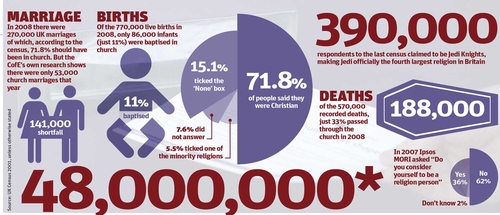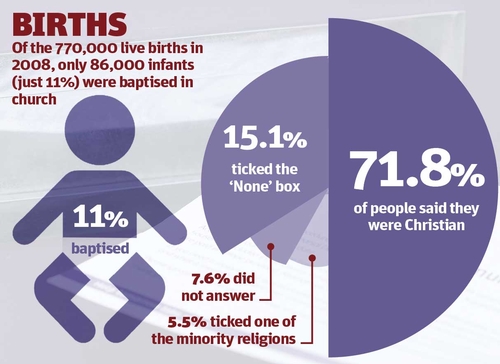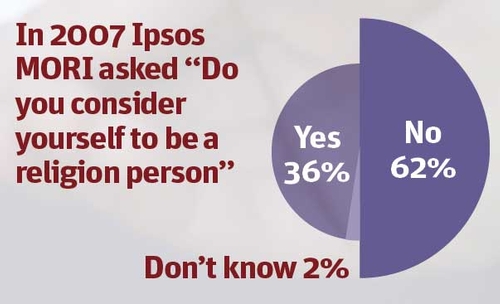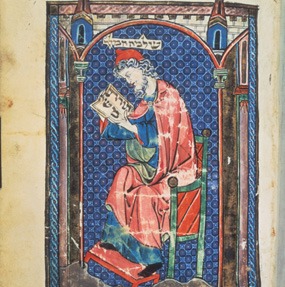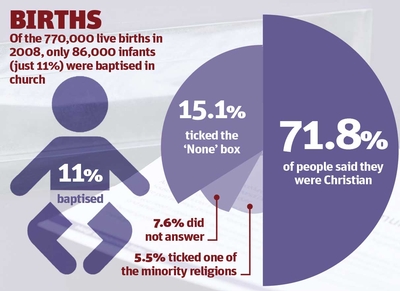
The last UK census was in 2001, the next will be on 27 March 2011. In 2001, for the first time, the census form asked people about their religion. New legislation was needed to make this possible. The 2001 census appeared to confirm Britain was indeed a Christian country, as 71.8 per cent of the public claimed to be Christian. Unfortunately there are good reasons to believe the question asked was flawed. Nonetheless the Office of National Statistics has insisted on repeating it again this year.
The census question asks baldly: “What is your religion?” There follows a list of the leading religions in Britain, including “None”, and respondents are asked to tick one of them, or write in an alternative. The clear implication of both the question and the list is that respondents have – or should have – a religion.
The new legislation decreed that answering the question must be optional. In 2001, 7.6 per cent of respondents did not bother. As things turned out, this did not materially affect the results. Additionally, spurred on by a chain letter started in New Zealand, some 390,000 respondents claimed to be Jedi Knights, making Jedi officially the fourth largest religion in Britain. Presumably these 390,000 don’t take religion too seriously – which has deeper implications, as we’ll see.
Despite the heavy hints embedded in the question, 15.1 per cent ticked the “None” box. In total 5.5 per cent ticked one of the minority religions: Muslim, Hindu, Sikh, Jewish or Other (including the Jedi Knights). With 7.6 per cent not answering, the remaining 71.8 per cent ticked “Christian (all denominations)”. This figure, equivalent to some 48,000,000 people, has since underpinned government religious policy. Let us dub these 48,000,000 people Census Christians, and explore whether – for most of them – their Christianity manifests itself in any way other than ticking a box on a census form.
The first crucial point is that, for many respondents, the census question sets up a false dichotomy. For the 5.5 per cent in minority religions the question is straightforward. But manifestly nobody who is not from a religious minority would claim to be, say, a Muslim, Sikh or Jew. So for the majority of those who answered, the fundamental tick-box choice was Christian or None. But this is far too crude. Faced with such a dichotomy, people shy away from saying they have absolutely no religion. Many are consciously uncertain: agnostic. About half the population believes there may be a God of some kind, and large numbers of others believe in various aspects of the supernatural. All this makes many people unwilling to state unequivocally they have no religion. And since the only other tick-box the census offers is “Christian”, this is the box they tick. But what does this mean?
Let’s consider the three key rites of passage: marriage, birth and death, the pivotal moments when religion should be crucial. But is it? No way. Take marriage. Since the peak of 480,000 marriages in 1972 the number has plunged. In 2008 there were some 270,000 UK marriages of which, according to the census, 71.8 per cent (about 194,000) should have been in church. In fact the Church of England’s own research, from which most of the following statistics are drawn, shows only 53,000 marriages took place in church that year – a shortfall of 141,000. Additional marriages will have taken place in other religious circumstances – but not remotely near 141,000. Moreover many of these will not have been among Christians.
Unsurprisingly then, few now baptise their infants. Of the 770,000 live births in 2008, only 86,000 infants – just 11 per cent of the total – were baptised in church. Even death no longer scares us into religious fervour. Of the 570,000 recorded deaths just 188,000 (33 per cent), including cremations, passed through church en route to their putative maker. Two-thirds of us, it transpires, feel no need for a clergyman’s blessing to speed us on our way.
In short, 71.8 per cent is an unsustainable figure. Far fewer than half the Census Christians have any truck with Christianity during marriage, birth and death. Moreover the numbers going to church for these rites have been steadily dwindling – in some cases plummeting (baptisms have fallen by 16 per cent in less than a decade).
Since most Census Christians do not go to church at these key times, it is hardly surprising they seldom go at all. The average Sunday church attendance in 2008 was 960,000 (just two per cent of Census Christians) – and again steadily falling. A handful go during the week, but they barely affect the statistics. Even the birth of their Lord doesn’t excite much Christian commitment: just over 2.7 million attend church or cathedral at Christmas.
In contrast, 48 per cent of the population say they go to church either “Never” (43 per cent), or “Practically Never” (five per cent). If 71.8 per cent of the population are Christian, how can it be that 48 per cent effectively never go to church, and the vast majority of the rest go so very rarely – only two per cent each Sunday? Moreover those who do go are mostly elderly. Among under-35s no fewer than 55 per cent never or practically never go to church. Every single study of religion in Britain shows that the young are drifting away.
While a 2010 ONS survey, perhaps unsurprisingly, confirms its own census figures, non-governmental surveys – using less blatant questions – consistently reveal Christian numbers to be far lower. Here are some recent findings. The Seventh-day Adventists’ website reported in 2007 that in Britain 53 per cent claimed to be Christian, while 39 per cent had no religion. In 2008 the highly regarded British Social Attitudes survey roughly confirmed these figures, with only 50 per cent of the population claiming to be “Christian” and 43 per cent claiming to have no religion; moreover 49 per cent of those who identified themselves as Church of England members said they never attend church services at all. (And the most recent BSA data suggests there may now be more non-religious people than Christians.)
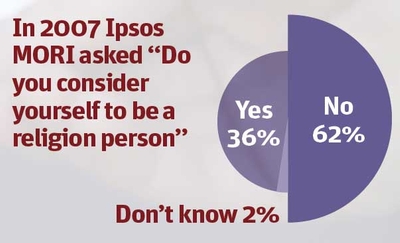 So how can the census figures be right? Much light is thrown on the issue by a 2007 Ipsos MORI survey. Ipsos MORI have been surveying religious belief in Britain since 1992, so have more knowledge of the subject than most. In 2007, instead of asking the blunt “What is your religion?” they asked a representative population sample: “Do you consider yourself to be a religious person?” Answers: No – 62 per cent, Yes – 36 per cent, Don’t know – 2 per cent.
So how can the census figures be right? Much light is thrown on the issue by a 2007 Ipsos MORI survey. Ipsos MORI have been surveying religious belief in Britain since 1992, so have more knowledge of the subject than most. In 2007, instead of asking the blunt “What is your religion?” they asked a representative population sample: “Do you consider yourself to be a religious person?” Answers: No – 62 per cent, Yes – 36 per cent, Don’t know – 2 per cent.
So whether or not people “have” a religion, nearly two-thirds of them do not consider themselves religious. This is a crucial distinction. It explains why so many Census Christians do nothing about their religion and why 49 per cent of C of E members never attend services. For these people Christianity is something they were born with but are now indifferent to, because they are “not religious”. For the great majority of the population religion plays little or no part in their lives. They are all Jedi Knights.
Most Census Christians, I suggest, feel the same about Christianity as non-football fans feel about the World Cup. They are not against it, but it is irrelevant to them. If anyone asks which country they support they probably say England, because that is what is expected. But in reality they don’t give a monkey’s.
Unfortunately the country’s leaders cannot accept these easy-going truths. They feel nation states need organised religions. “Religions Are Good For You!” runs their unspoken mantra. So, governments have used the 71.8 per cent statistic to help them justify increasing the number of faith schools, funding faith-based organisations, keeping 26 bishops in the House of Lords, dedicating a disproportionate number of hours to religious broadcasting, continuing collective worship in schools and much more. It is all futile, as we have seen. Meanwhile the national census is being dragged into disrepute to support a religion about which British people, in general, don’t give a fig.
The British Humanist Association is running a Census Campaign, urging the non-religious to tick “No religion” in the 2011 census.
